Consumers today expect fast, personalized, always-on service. Regardless of the time and channel, they anticipate answers instantly when they reach out to businesses. Moreover, they want those answers to feel personal, not robotic or generic messages they’ve heard one too many times before.
AI customer service tools help businesses meet these expectations and deliver tailored support 24/7. They help teams by automating repetitive tasks and enabling timely, adaptive responses to changing customer needs.
However, not all AI tools are created equal. Some tools specialize in friendly, customer-facing chatbots, while others work in the background, classifying tickets or detecting sentiment. Some even guide live agents with real-time suggestions during conversations.
In this guide, we highlight the top AI customer service tools that businesses can use to streamline support without losing the human touch that consumers look for. We also explore key features, KPIs, and best practices.
What Are AI Customer Service Tools?
AI customer service tools are a powerful suite of technologies designed to enhance every layer of customer interaction, from the first automated greeting to backend ticket handling and real-time support. You’ve probably encountered AI-powered chatbots, but behind the scenes, more advanced systems are also at work. Here are just a few of these valuable tools:
- AI chatbots that handle customer inquiries through text or voice
- Virtual assistants that support multimodal interactions across channels
- Agent copilots that suggest real-time replies or summarize past conversations
- Sentiment and intent detection tools that gauge customer tone and urgency
- Automated routing and ticket classification tools that cut down resolution time
- Generative AI that drafts personalized responses, knowledge base articles, or follow-up summaries
- Predictive analytics tools that flag churn risks or forecast common issues before they escalate
- IVR and voice AI systems that streamline phone-based interactions
Powering these tools are core technologies like natural language processing (NLP) to understand human input, machine learning to improve over time, conversational AI for fluid interactions, and LLM-based generative AI to create humanlike content at scale.
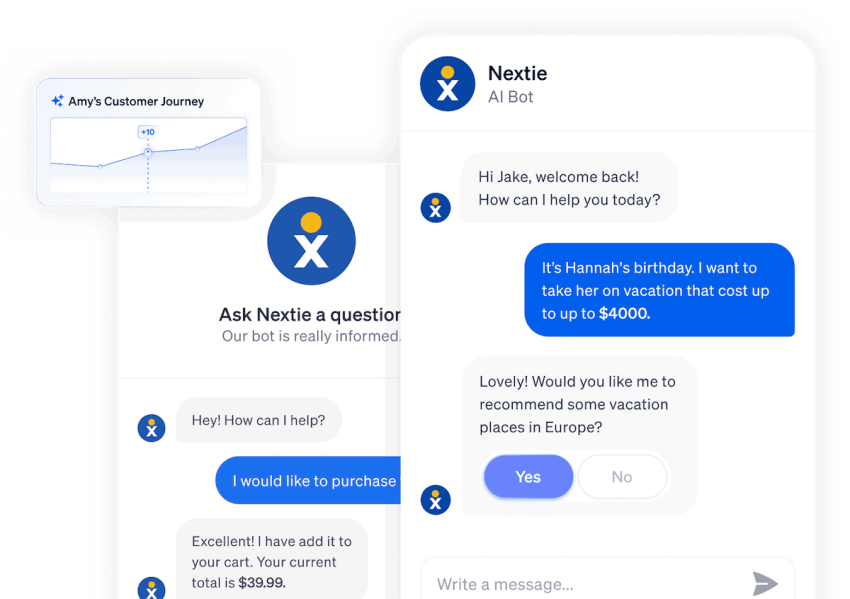
What happens when you utilize these tools and technologies? You gain the benefits of AI, like less manual triage and fewer backlogs. You also get faster, smarter, and more consistent support across every channel. All without overwhelming your team.
Top 12 AI Customer Service Tools for 2025
1. Nextiva

Nextiva is a unified platform designed specifically for customer experience management. The platform’s conversational AI with NLP delivers humanlike interactions across voice, chat, SMS, and email. Its AI copilot provides real-time agent recommendations and automates post-call summaries. Other integral features include smart routing that directs issues based on context and sentiment, and full CRM integration that gives agents complete customer context.
Nextiva’s native platform unifies channels and AI workflows in one place, bringing AI into every stage of the customer support journey.
Best for: Businesses that want to combine communications, automation, and insights into one platform
2. Zendesk

Zendesk, a cloud-based platform for SaaS customer service solutions, blends AI tools seamlessly into a tried-and-tested ticketing ecosystem. Zendesk AI tools include intent detection, auto-tagging, and macro suggestions. The native bot builder is straightforward, and Zendesk’s marketplace integration is one of the largest out there, with a vast selection of apps for agent workflows. Strong analytics and omnichannel workflows make Zendesk a reliable platform for customer support teams.
Best for: Enterprise teams with structured ticketing environments and streamlined support flows
3. Intercom

As an AI customer service company, Intercom provides the tools needed to support existing help desks. Its finely tuned AI chatbots (Fin) pull information from your knowledge base to answer customer queries and resolve issues. Its AI engine is capable of engaging in hyper-relevant conversations without agent intervention, making it highly effective in chat, product tours, and personalized responses to user-specific triggers.
Best for: SaaS companies and start-ups prioritizing contextual conversations and real-time customer engagement
4. Freshdesk

Freshdesk combines AI and ticketing automation to equip businesses with the tools they need for AI-driven customer service. Its visual workflow builder simplifies automation, even for nontechnical support teams. Its AI enables intelligent bot replies, smart ticket categorization, and predictive customer satisfaction (CSAT) scoring.
Best for: Mid-size companies looking to automate common requests and routine tasks
5. Ada
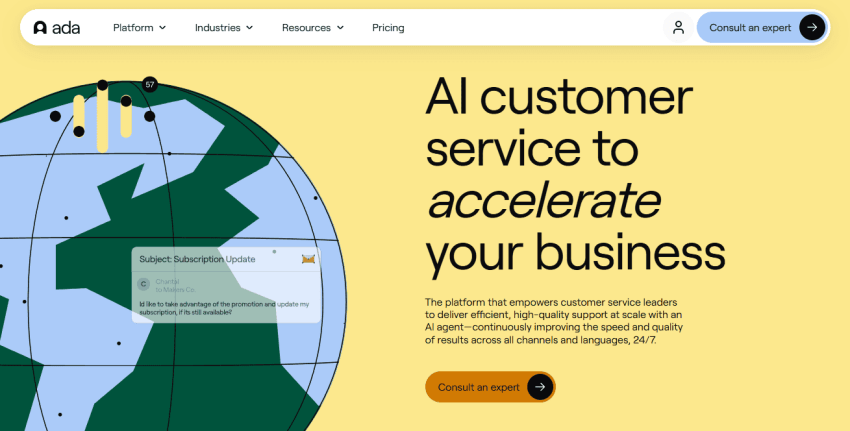
Ada makes it easy for all kinds of businesses to implement AI customer service. Focusing on self-service automation and e-commerce support, it enables users to customize the AI solutions they need to create meaningful relationships with their customers. Its deep integrations with platforms like Shopify and Salesforce help ensure quick setup and scalable deployment.
Best for: High-volume customer support with repetitive, transactional customer questions
6. Kustomer

Kustomer is an AI-powered customer service CRM platform that empowers businesses to provide exceptional service at every touchpoint. With AI that detects issue urgency and intent, it brings intelligence into proactive outreach. Its timeline feature unifies all customer touchpoints for full context at a glance.
Best for: Customer service teams managing high ticket volumes and proactive, informed support
7. Balto
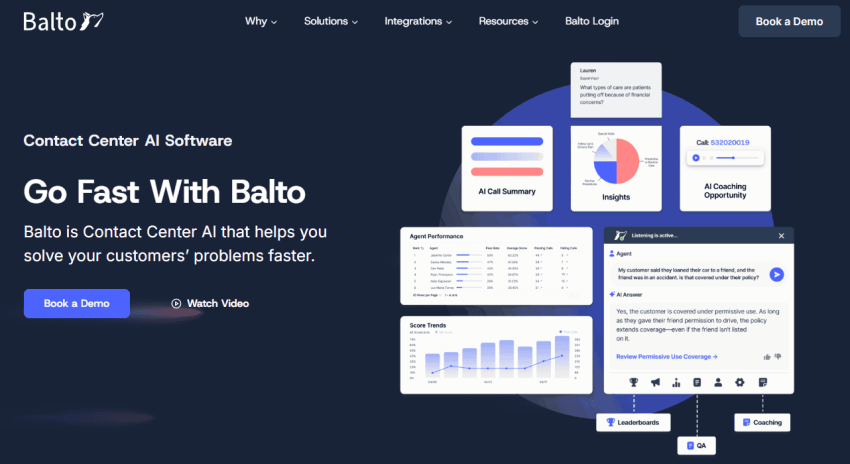
Balto is a customer service software that supports live conversations with on-call guidance. It tracks script adherence, compliance, and call quality in real time, giving support agents a helpful nudge when it matters most. Think of it as a GPS for live phone calls, guiding agents on what to say next.
Best for: Sales and service teams that prioritize live voice interactions and information accuracy
8. ChatBees

Using retrieval-augmented generation, ChatBees delivers hyper-accurate answers for internal and external support teams. Capable of pulling answers from company policies, knowledge bases, historical data, and other sources, it can resolve complex queries that need factual precision. Its pinpoint-accurate responses are grounded in real documentation, not just AI guesswork.
Best for: B2B support teams and internal help desks needing precise, policy-grounded answers
9. Help Scout

Help Scout, a customer communication platform, gives growing businesses the help they need without the complexities of over-engineered solutions. Its lightweight AI offers reply suggestions and saved responses for customer-centric support. Its shared inbox also detects collisions, reducing confusion when multiple agents handle the same ticket.
Best for: Small teams focused on support quality and simplicity over volume
10. NICE CXone
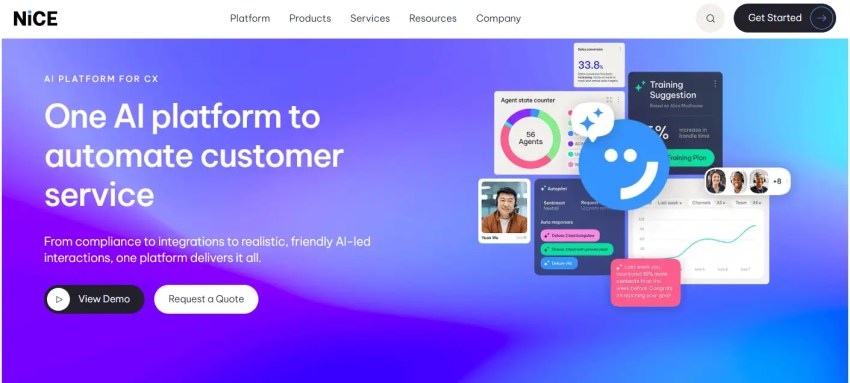
NICE CXone is a comprehensive suite of enterprise-grade AI tools for intelligent routing, predictive analytics, sentiment detection, and many other tasks for CX management. Its modular architecture and robust tech stack give large businesses the flexibility to adapt solutions to different use cases.
Best for: Large-scale call centers with complex and omnichannel demands
11. Genesys Cloud CX
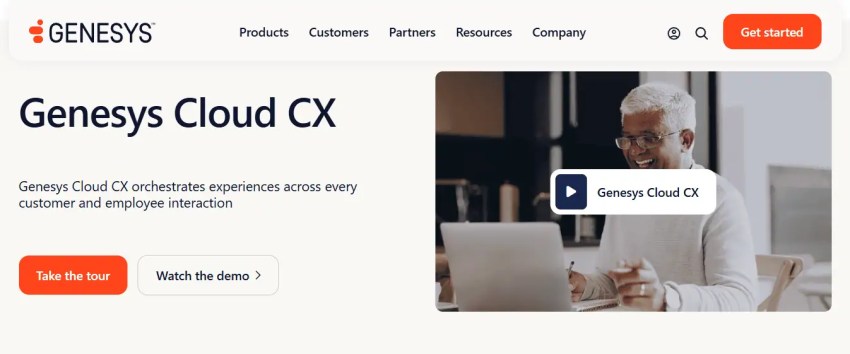
Genesys Cloud CX combines predictive routing with conversational AI to deliver exceptional customer experiences across all digital channels. Its strong NLP and sentiment analysis features ensure that every conversation is meaningful.
Best for: Global organizations with complex support flows
12. Drift

Personalized conversations convert more leads and create memorable buyer experiences. Drift AI Chat agent makes sure these conversations happen. Playbooks and workflows are geared toward conversion, and AI chatbots qualify leads at key funnel stages. By giving customers the right help at the right moment, this tool drives conversions rather than just deflecting support tickets.
Best for: Marketing and CX teams looking to unify support and growth, aligning customer experience with revenue goals
When and Where to Use AI in Customer Support
| Use Case | AI Tool Example | Outcome |
|---|---|---|
| Triage + classification | Nextiva, Freshdesk, Zendesk | Faster routing, reduced backlog |
| FAQ and self-service | Ada, Intercom, ChatBees | Lower ticket volume |
| Real-time agent assist | Balto, Nextiva, Genesys | Higher FCR, reduced average handling time |
| Proactive engagement | Drift, Kustomer | Increased CSAT and retention |
| Summarization + insights | Nextiva, ChatBees, Help Scout | Faster documentation, better QA |
AI Customer Service Strategies That Drive Results in 2025
By the end of 2025, AI is projected to handle 95% of all customer interactions across both voice and text, making artificial intelligence a defining factor in modern customer support. The question isn’t whether to adopt AI, but how to implement it effectively.
6 Winning AI Strategies for 2025
1. Hyper-Personalization at Scale
Modern AI analyzes customer profiles, purchase history, and past interactions to deliver personalized responses in real time. Companies like Sephora and Delta use AI to understand not just what customers ask, but the context and emotions behind each request.
Nextiva’s Unified-CXM platform consolidates customer data from multiple sources into a single view, enabling personalized support across voice, chat, SMS, and email without agents switching systems.
2. AI-Powered Chatbots for Common Issues
62% of customers prefer engaging with chatbots over waiting for human agents, but only when those chatbots deliver accurate, relevant responses. Deploy chatbots for high-volume, low-stakes tasks like order tracking and FAQs while keeping humans available for complex issues.
3. Sentiment Analysis for Smarter Routing
AI-powered sentiment detection identifies frustration, urgency, or confusion in customer messages. Nextiva’s real-time sentiment analysis routes upset customers to senior agents, alerts supervisors to high-risk conversations, and adjusts automated responses based on emotional tone.
4. Predictive Customer Service
Anticipate customer needs before they arise. Send proactive notifications like “Your package is delayed – here’s a new ETA” or “We noticed your usage dropped. Need help?” This shifts support from reactive to proactive, reducing inquiry volume while improving satisfaction.
5. Real-Time Agent Assist
75% of CX leaders see AI as a force for amplifying human intelligence, not replacing it. Agent assist technology surfaces relevant knowledge articles, suggests responses, analyzes sentiment, and automatically summarizes calls, helping agents work faster without replacing them.
6. Omnichannel AI Support
Maintain conversation context as customers move between chat, email, and phone. Nextiva unifies all channels on a single platform with shared data, so customers never repeat themselves and agents see complete interaction history regardless of how customers reach out.
Emerging Trends to Watch
Several key trends are shaping AI customer service in 2025:
Seamless channel switching. Customers expect to jump between chat, email, social media, and voice without repeating information. Integrated AI tools connect these touchpoints automatically.
Proactive support. Instead of waiting for customers to reach out, AI anticipates needs and provides assistance before problems occur, like Amazon and Apple already do.
Agent empowerment over replacement. The best implementations position AI as a co-pilot that surfaces knowledge and generates suggestions, helping agents handle difficult moments more effectively.
Transparent, responsible AI. 73% of clients are more critical of commercial communication than in previous years. Customers want to know when they’re talking with bots, how their data is used, and what safeguards prevent bias.
How to Choose the Right AI Vendor
When evaluating AI customer service platforms, prioritize these factors:
Integration capabilities. Ensure seamless connections with your existing CRM, helpdesk, and communication tools: Salesforce, Zendesk, ServiceNow, or whatever your team uses.
AI quality. Test how well the platform understands natural language and handles real-world conversations. Request demos with your actual customer data.
Omnichannel support. Choose platforms that work across chat, email, SMS, voice, and social media with unified data and consistent experiences.
Security and compliance. Verify GDPR, HIPAA, or SOC 2 compliance as needed. Modern platforms automatically mask sensitive information like credit card numbers and addresses during conversations and in transcripts.
Analytics and reporting. Look for rich insights on KPIs, sentiment trends, and team performance to measure success and identify improvement opportunities.
Try platforms before committing, and involve both front-line agents and IT teams in the selection process.
Assess Your AI Maturity First
Before investing in new AI tools, evaluate your current maturity level:
Adoption: Is AI handling basic tasks like ticket triage, or powering real-time agent assistance across multiple use cases?
Impact: Are resolution times improving? 72% of CX leaders say they’ve provided adequate training for generative AI tools, but 55% of agents say they haven’t received any training. This gap indicates a maturity issue that technology alone won’t solve.
Scalability: Is AI deployed across all channels, or siloed in just one?
Agent trust: Do agents rely on AI recommendations, or ignore them?
Understanding your starting point helps you invest strategically in capabilities that address real gaps. Only 9% of companies have mature AI adoption, making effective implementation a genuine competitive differentiator.
Why Nextiva’s Approach Works
Nextiva delivers integrated AI capabilities across the entire customer experience:
- Real-time sentiment detection and intelligent routing across all channels
- AI-powered agent assist with knowledge surfacing and response suggestions
- Automated workflows that handle post-call summaries and ticket classification
- Unified data platform that eliminates silos – 81% of companies say this improves CX
Supporting over 1 million users and 100,000 businesses, Nextiva combines enterprise-grade tools with simple setup that doesn’t require dedicated IT resources. 84% of companies with mature AI for customer experience report high value from their investments, and 53% that invest in employee AI training see the highest satisfaction and ROI.
How to Track AI’s Effectiveness
Success isn’t just about deploying AI — it’s about knowing whether it’s working and delivering the expected outcomes. Here are the key metrics that separate good guesses from smart growth.
AI containment rate
The containment rate measures the percentage of customer inquiries fully resolved by AI tools such as chatbots, IVR, and virtual agents. It’s used to evaluate how well an AI tool performs common workflows like password resets or providing shipping status updates. A high containment rate signals effective automation, but you should pair it with satisfaction metrics to confirm the experience is smooth and that customers are truly happy.
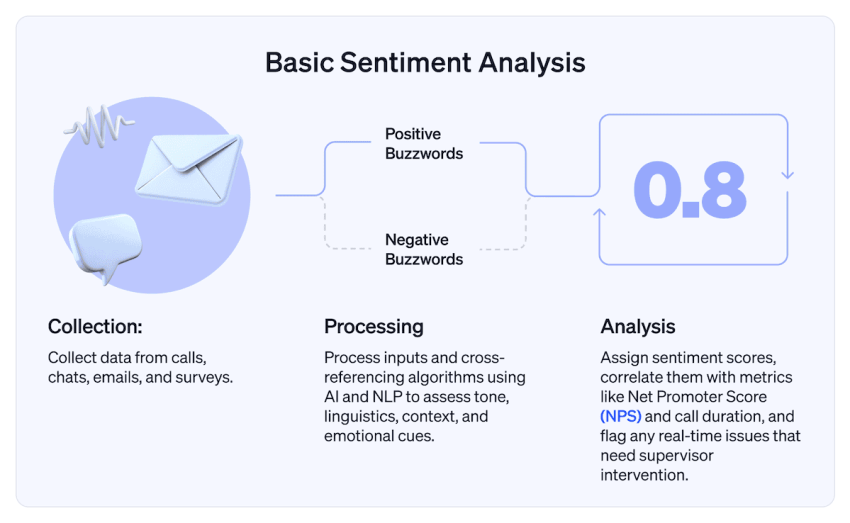
Escalation rate
You can track how many AI-initiated interactions end up with human agents through the escalation rate. A moderate rate is fine, but a rate that’s too low might suggest customers are stuck in automation loops. A deeper look at escalation rates can help identify which customer issues are too complex, emotionally sensitive, or unclear for AI to resolve on its own.
Average handling time
This metric compares the time it takes to resolve issues with and without AI involvement. When it’s effective in suggesting next actions, summarizing issues, and routing tickets intelligently, AI should reduce average handling time and improve response times. If it doesn’t, use this metric to identify the specific workflows where AI might be adding friction or where it can be used to accelerate processes.
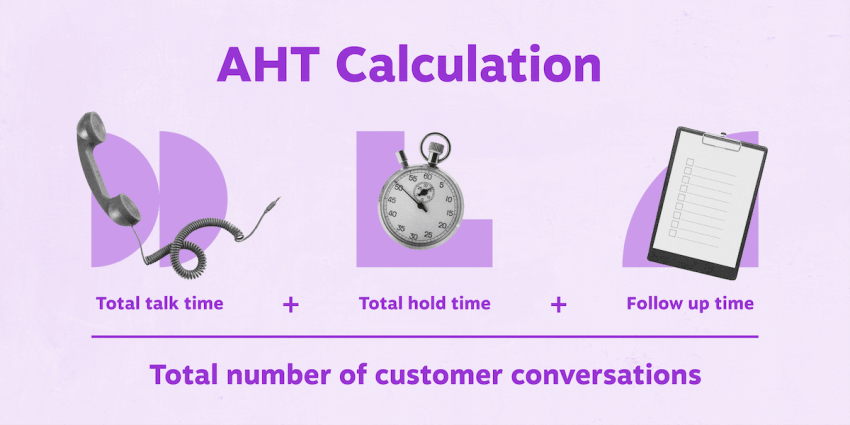
CSAT and customer effort score
CSAT and customer effort score (CES) help gauge how users feel after an AI interaction. Break these down by channel (chatbots, IVR, or live chat) to see where automation is helping or hurting. CES is particularly important in determining whether AI-led or AI-assisted interactions are easy or are making customers jump through hoops.
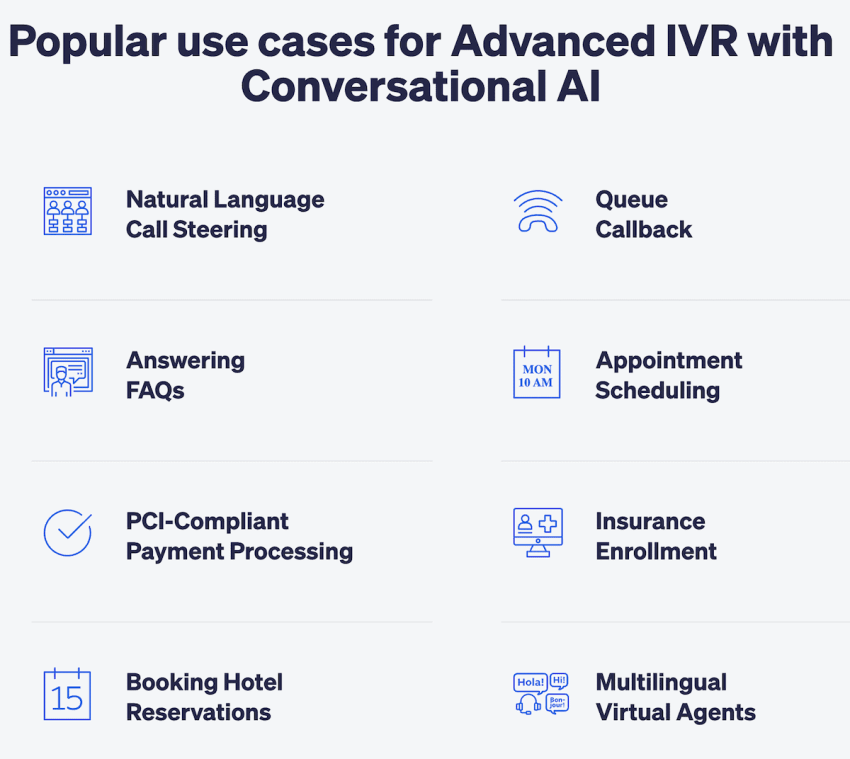
Knowledge deflection rate
When customers solve their issues through AI-surfaced help articles or self-service workflows without creating tickets, it’s a win for everyone. A good knowledge deflection rate shows the strength of your knowledge base and the AI’s ability to surface the right information for each customer.
Agent satisfaction
AI should lighten your agents’ loads, not frustrate them. The agent satisfaction metric helps you evaluate if AI is enabling your agents by reducing their workloads or giving valuable insights. It also shows you whether AI is actually making agents’ jobs harder because of poor suggestions or unclear handoffs. You can measure this metric through internal pulse surveys or direct feedback after shifts.
Best Practices for Implementing AI Support
While most AI customer service tools today offer practical plug-and-play functionality, it takes more than deploying them to gain customer service success. Here are some practices that you and your team can use to implement AI support.
- Start with narrow use cases. Don’t try to automate everything at once. Start with high-volume, low-stakes tasks like order tracking, billing concerns, or password resets. Check results and ROI, then gradually expand AI to other workflows.
- Use a unified knowledge base to ground all AI responses. Your AI is only as good as the information it pulls from. Consolidate your help content, structure it well, and update it frequently to keep your AI sharp. Keep in mind that AI thrives on clean and structured inputs, so make sure your AI bots have a trusted, centralized source to pull data from.
- Monitor interactions to refine performance and detect drift. AI isn’t “set it and forget it.” To optimize its use, regularly review transcripts, chat logs, and customer sentiment scores. This enables you to catch errors or outdated responses. You can also use customer feedback buttons and surveys to refine performance regularly.
- Train and retrain your AI on actual customer language. Train on real conversations. Use real tickets and social media messages, including messy language (slang, typos, and emotion-laced messages), to help your AI understand how customers really speak. By feeding your AI real interactions, you can help it understand intent, tone, and natural language variations.
- Give customers easy access to human agents when needed. You don’t want to trap users in automation loops, so always offer a human fallback. Make it easy to escalate, especially when urgency or emotion is involved. Offering a clear path to human help for time-sensitive complaints, cancellations, and complex issues helps you preserve customer trust.
- Align AI with your CRM to add context to every interaction. Integrate AI with your Salesforce, HubSpot, Zoho, or whichever CRM tools you use. This allows agents and bots to reference previous purchases, tickets, and history for faster and more personalized support. When your AI understands a customer’s preferences and pain points, every conversation becomes smarter and more satisfying.

Automate More of Your CS Processes With Nextiva
Since each AI customer service tool has its own strengths, it might seem like a good idea to use a different platform for each process. However, juggling separate tools can be chaotic. Instead of relying on disparate tools, you can improve efficiency and boost productivity with a unified platform like Nextiva.
Unlike other vendors that specialize in just one feature, Nextiva provides a CX platform that’s easy to deploy and powerful enough to scale with enterprise growth. As a powerful UJET alternative, it brings AI into every part of the customer support journey:
- Conversational AI for chat, voice, and email support
- Real-time agent assist for better conversations and faster resolutions
- Call summary generation that turns every call into structured data
- Smart routing and CRM context to personalize every interaction
- Reliable omnichannel support, from live chat to phone to SMS
With Nextiva, you get a unified AI-powered customer experience platform. One login. One source of truth. Endless potential to make service faster, easier, and more human.
AI won’t replace your team, but it will transform their capabilities. The future of customer service is about machines and humans working smarter together.
Start building smarter customer experiences with Nextiva today.
Top AI-Powered Contact Center Solution
Transform your customer interactions with a contact center platform that saves you time and money, reduces agent and supervisor stress, and flexibly adapts to fit your needs.

















 Customer Experience
Customer Experience 










